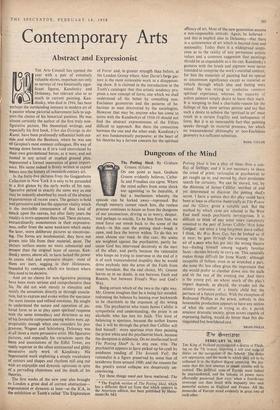Dungeons of the Mind The Potting Shed. By Graham Greene.
(Globe.) ON one point at least, Graham Greene evidently believes, Catho- lic and Freudian can agree. Where the mind suffers from some shock too agonising ' to be bearable, it has a mechanism whereby the episode can be locked away—repressed. But though memory cannot reach him, the restless prisoner continues to haunt us from the dungeons -of our unconscious, driving us to worry, despair, and perhaps to suicide. To be free from him, we must force our minds back to the scene of the shock—in this case the potting shed—break it open, and face the horror within. To do this we must choose our road. In this case, the scales are weighted against the psychiatrist, partly be- cause God has, intervened decisively at the start of the affair, and partly because the rationalist who keeps on trying to intervene at the end of it is of such transcendental stupidity that he would drive anybody into the arms of the Faith from sheer boredom. But the real choice, Mr. Greene leaves us in no doubt, is not between Faith and Reason, but between Freud's Wav and God's Way.
Being certain which of the two is the right way, Mr. Greene imagines that he is being fair-minded, redressing the balance by leaning over backwards to be charitable to the exponent of the wrong one. The psychiatrist who treats James Callifer is sympathetic and understanding; the priest is an alcoholic who has lost his faith. This kind of balancing is spurious, because the author knows that it will be through the priest that Callifer will find himself : more spurious even than painting the priest white and the psychiatrist black, because the deception is deliberate. On an intellectual level The 'Potting Shed* is, in any case, trite. The psychiatrist appears to have picked up his craft by assiduous reading of The Seventh Veil; the rationalist is a figure preserved by some feat of taxidermy from around 1900; and the reasons for the priest's moral collapse are desperately un- convincing.
Yet these things need not have mattered. The * The English version of The Potting Shed, which has a different third act from that which appears in the American edition, has been published by Heine- mann (8s. 6d.). Potting Shed is less a play of ideas than a con- flict of feelings; and it is not necessary to share the creed of priest, rationalist or psychiatrist to get caught up in, and moved by, their passionate search for certainty. We can be moved, too, by the dilemma of James Callifer, terrified of and yet determined to discover the potting shed's secret. I have a notion that the play could have been at least as effective theatrically as The Power and the Glory, given a suitable cast. But the method by which casts are selected in the West End itself needs psychiatric investigation. It is difficult to think of any actor more completely unsuited to the part of James Callifer than John Gielgud : not since a long-forgotten piece called, I think, He Was horn Gay has he looked so ill at ease; he goes through the evening with the air of a..xnan who has got into the wrong theatre but—finding himself among vaguely familiar faces—decides bravely to carry on. This naturally makes things difficult for Irene Worth : although incapable of failure, even in so wretched a part, she none the less often gives the impression that she would prefer to clamber down into the stalls and sit the rest of the evening out. And there is the young girl, on whom much of. the play'4 impact depends; as played, she exudes not the salutary artlessness of a lonely child but the pertness of a future prefect. With the exception of Redmond Phillips as the priest, nobody in this lamentable production appears to have any notion of what the author is trying to do; a parish amateur dramatic society, given actors capable of expressing feeling, would do better than this dis- tinguished but bewildered cast.
BRIAN INGLIS






























 Previous page
Previous page